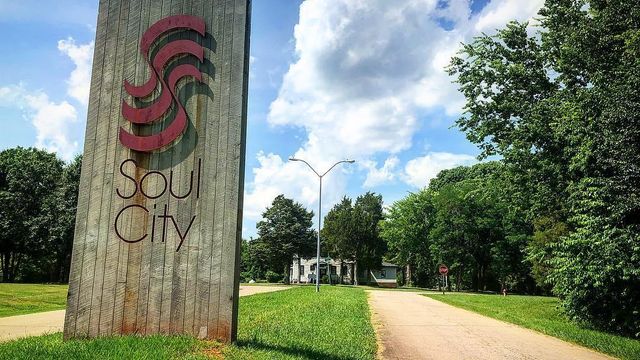Soul City: Ghost town of multi-racial Utopia in NC could be revived
At a glance, Soul City may seem like a ghost town - with an abandoned healthcare clinic, broken windows, cracked asphalt and walls curtained with creeping ivy. But in the 1970s, Soul City was built on the dream of equality and opportunity for Black families in North Carolina.
Posted — UpdatedJust an hour north of Raleigh you can find the remains of a grand dream.
At a glance, Soul City may seem like a ghost town – with an abandoned healthcare clinic, broken windows, cracked asphalt and walls curtained with creeping ivy. But in the 1970s, Soul City was built on the dream of equality and opportunity for Black families in North Carolina.
Today, few remnants offer clues to the community's past. Decaying wooden street signs etched with names like Freedom Circle and Liberation Road show the streets of Soul City were originally meant to pave a way to something greater. A tall concrete pillar with the words 'Soul City' stands as a monument to all the town hoped to achieve.
In the archives of Black history, many dreams have gone unrealized – snuffed out by forces like urban renewal, racism and inequality. However, some believe the dream of Soul City can still impact the next generation.
What was the vision of Soul City, North Carolina?
Established in the early 1970s by civil rights leader Floyd McKissick, the vision was to create a multi-racial community where Black capitalism and Black-owned businesses could thrive right in the midst of rural North Carolina.
"People were historically leaving [North Carolina] and going to the Northeast looking for jobs and opportunities," said McKissick. "We wanted to provide them here. To provide a quality of life that people could enjoy right here in North Carolina."
At the height of its development, Soul City would have spanned 3,600 acres. The community boasted a 500-acre industrial park, employed more than 200 people at Soul Tech, and managed its own fire station and other infrastructure. They also had Warren County's only public swimming pool.
"It could have been a wonderful city," said McKissick. "(It) brought together people of different races, allowed opportunities to excel regardless of your background, to be a part of a vibrant community."
But Soul City never reached the heights he or his father envisioned.
What happened to Soul City?
Today, many people are not even aware Soul City ever existed – as if its very dream has been erased from the history books.
For those who do know about Soul City, many still wonder: What happened?
There were several factors, according to McKissick.
At the time, Soul City was the largest development being pursued by an African American development firm. It was bringing in millions of dollars and attracting millions of dollars from Wall Street to build infrastructure that’s still being used today.
"Somehow that became threatening to people," said McKissick. "Black capitalism. Black people owning and operating businesses. Black people building a city. They couldn’t envision a city that would have been a multi-racial community."
Senator Jesse Helms and Congressman Lawrence Fountain called for an audit of the Soul City project, recalls McKissick. They alleged financial improprieties and shared suspicions of inappropriate finances.
"When the audit was released, they found no improprieties. No wrong-doing," said McKissick. "But the damage was done."
A struggling economy in the mid-1970s also didn't help matters. By 1979, the federal government pulled its support for the Soul City project.
"The people in Warren County were hurt most by the collapse of Soul City," said McKissick. "They were building homes people could afford."
Eventually, the McKissick family ended up selling most of the land – and the dream of Soul City collapsed.
Could Soul City be revived?
After more than 40 years, time and nature have slowly devoured some of the buildings and roads – but the essential resources and infrastructure – the roads, the water, the sewer – are all still there, said McKissick.
The building that once housed Soul Tech has been transformed into offices for the State Department of Corrections. There's a volunteer fire department in the old fire station. The park and pool are still standing, waiting for families to come play. The church is still active and well-kept, an idyllic sight on a grassy hillside.
More importantly, new homes are being built. McKissick believes that's a good sign for the future of Soul City. When he looks around the land today, he says he sees a renaissance.
During a time when affordable homes are becoming so difficult to find in the Triangle area, the Soul City area has new homes with affordable prices not far from the Triangle.
"Will it ever become the community we envisioned and planned for?" he asks. "No. But, as people are priced out of the Raleigh area, living here in Soul City where it's only a 45-50 minute commute is very viable because it's far, far, far more affordable."
He says he's also hopeful because the culture is shifting – and a new generation is fighting to support the dream of equality. A new generation is bringing the desire to support Black-owned businesses and remember Black history.
He says he believes the legacy of Soul City can still make an impact.
"I think it can motivate," he said. "It can inspire the next generation to dream – and to dream bigger."
• Credits
Copyright 2024 by Capitol Broadcasting Company. All rights reserved. This material may not be published, broadcast, rewritten or redistributed.






